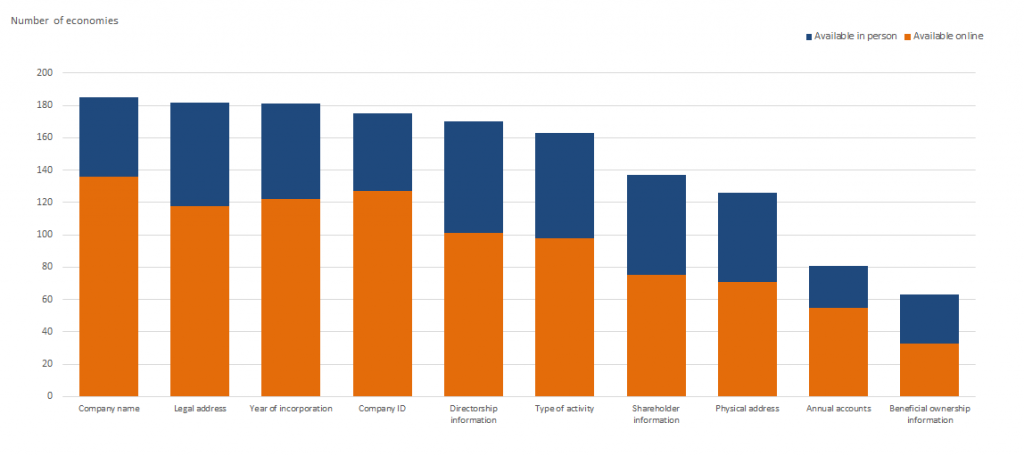 Registration concept
Registration concept
Access to information, including relevant data, is critical to reduce poverty. Data systems for public and private intent data tend to exclude the poor, considering that statistical capacity and data literacy remain limited in developing economies. Efforts to improve the accessibility and fairness of data systems need to address inequalities, as the World Development Report 2021: Data for Better Lives has shown. Business registries can contribute to that effort by making company information transparent and easily accessible to anyone. Business registries are agencies responsible for registering firms and for granting them the status of a legal entity.
Transparency of company information is an important aspect of the business environment as it stimulates investment and can reduce transactional costs. When corporate information is made available to the public, investors can make sound decisions when deciding with whom to do business, while clients and suppliers can obtain relevant information on service providers and competitors.
Business registries are considered key assets to users as they provide the most important information on legal entities and its owners before interested parties decide to do business with them. This can help prevent corruption, fraud, and money laundering. The amount of publicly disclosed company data indicates the transparency of business registries.
For instance, the Companies House – the United Kingdom’s business registry – adopted a transparent, accessible and free-data model. As the jurisdiction with one of the highest number of company searches (over 5 billion in 2019), the Companies House found that, by making company information available and free of charge, it generated an estimated aggregated benefit in new business opportunities and increased revenue to the data user between £1 billion and £3 billion per year.
What type of company information is commonly made available?
The most common information available in a business registry in 2020 was the company's name, legal address and the year of incorporation (Figure 1). Most countries disclose the above-mentioned information. In Europe and Central Asia, every economy shares information in the online format on the company’s name, company’s ID and directorship information. All South Asian economies have publicly disclosed information, in person or online, regarding the company’s name, identification number, directorship, shareholder information and the legal address.
Figure 1. Company name, legal address and year of incorporation are the most common features of information made available at business registries

Source: Doing Business database. Note: The sample includes 191 economies.
However, it is less common to obtain information on beneficial ownership, company annual account and the company's physical address. In 136 out of 191 economies in 2020, no information regarding the beneficial owners was disclosed, followed by annual accounts, which were not available to the general public in 118 economies. The OECD high income countries had the highest disclosure rate on beneficial ownership information at 44%, while East Asia and the Pacific had the lowest at 16%. Regarding annual accounts, the lack of information was the highest in the Middle East and North Africa and in South Asia, where 5% of economies did not share information on it. Conversely, the OECD high income countries were the most transparent in terms of annual accounts disclosure; only 26% of these economies did not share information in this area.
How can business registries share information as a tool to combat corruption?
Business registries are often the first public institutions with which aspiring entrepreneurs interact. They are the first public agency that entrepreneurs meet when they want formally to start a new business. When business registry information is easily accessible and can be searched remotely, it can facilitate business transactions by removing unnecessary steps and reducing transactions costs.
The level of transparency in an economy tends to be associated with the level of transparency of information at its business registry (Figure 2). OECD high income economies like Denmark and New Zealand, which perform best in the Corruption Perception Index (CPI) of 2020, disclose details on all main areas of company information online.
Figure 2. The level of information shared by business registries is associated with the overall perception of corruption in economies
Source: Doing Business database, Transparency International
Note: The sample includes 174 economies and the relationship is significant at the 1% level after controlling for income per capita. The Corruption Perception Index score shows the worst (0) and best performers (100). The types of information available at the company registry reflects the countries with the least (0) to most (10) amount of company data available online.
To sum up, indicators on transparency of information look better today than in previous years. Since 2018, there has been a continuous increase of information made available online. Information on beneficial ownership has become the most transparent aspect over the years: In 2018, only 16 economies made this information available online. This increased to 33 in 2020. Annual accounts have been the second aspect with the biggest increase in transparency in the online format since 2018. Croatia, the Czech Republic and Romania are among economies that have made beneficial ownership information available online since 2019, while Fiji and Georgia have made annual accounts available online during the same period.
Transparent business registries reduce information asymmetry among entrepreneurs and broaden the pool of potential investors. Business registries across the world are companies’ and entrepreneurs’ best ally and should continue improving their level of transparency of company information as this strengthens entrepreneurship, discourages fraud and corruption, and increases investment.




Join the Conversation